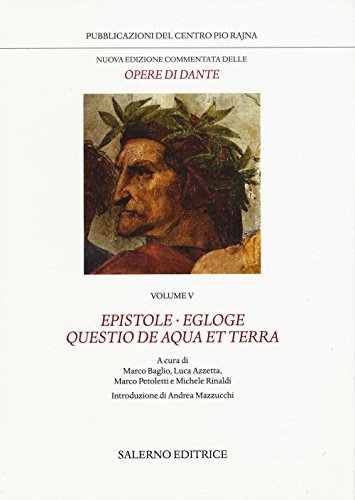Part of Series
Il trattato sull’eloquenza volgare (De vulgari eloquentia), composto probabilmente tra la fine del 1302 e i primi mesi del 1305, lasciato interrotto, inaugura la serie della Nuove Edizione Commentata delle Opere di Dante. Il curatore, Enrico Fenzi, proponendo interessanti varianti di lezione al testo tradizionale, ne offre una nuova monumentale edizione corredata di una originale traduzione letterale, di un ampio commento, che cerca di cogliere le suggestioni del discorso dantesco su un tema nuovissimo per il tempo e nel contesto storico in cui veniva affrontato, indagandone le possibili ‘fonti’. Importante novità di questa edizione sono le due serie di testi franco-provenzali e italiani che riproducono integralmente i documenti poetici che Dante cita e talvolta discute, e una seconda appendice con il volgarizzamento del trattato di Giangiorgio Trissino – che nel 1529 ha offerto la prima edizione a stampa (tradotta) dell’opera dantesca prima di fatto sconosciuta. Completano l’edizione vari Indici – tra cui, oltre l’Indice analitico, un Indice sommario dell’opera, utile a un rapido scorrimento dei suoi contenuti –, e, allegata al volume, una serie di cartine geografiche (curate da Francesco Bruni), che vogliono offrire al lettore un quadro della visione dantesca dell’Europa e dell’Italia geolinguistica nonché “politica” al tempo di Dante, in base alle conoscenze geografiche del suo tempo.
Author

Dante Alighieri, or simply Dante (May 14/June 13 1265 – September 13/14, 1321), is one of the greatest poets in the Italian language; with the comic story-teller, Boccaccio, and the poet, Petrarch, he forms the classic trio of Italian authors. Dante Alighieri was born in the city-state Florence in 1265. He first saw the woman, or rather the child, who was to become the poetic love of his life when he was almost nine years old and she was some months younger. In fact, Beatrice married another man, Simone di' Bardi, and died when Dante was 25, so their relationship existed almost entirely in Dante's imagination, but she nonetheless plays an extremely important role in his poetry. Dante attributed all the heavenly virtues to her soul and imagined, in his masterpiece The Divine Comedy, that she was his guardian angel who alternately berated and encouraged him on his search for salvation. Politics as well as love deeply influenced Dante's literary and emotional life. Renaissance Florence was a thriving, but not a peaceful city: different opposing factions continually struggled for dominance there. The Guelfs and the Ghibellines were the two major factions, and in fact that division was important in all of Italy and other countries as well. The Pope and the Holy Roman Emperor were political rivals for much of this time period, and in general the Guelfs were in favor of the Pope, while the Ghibellines supported Imperial power. By 1289 in the battle of Campaldino the Ghibellines largely disappeared from Florence. Peace, however, did not insue. Instead, the Guelf party divided between the Whites and the Blacks (Dante was a White Guelf). The Whites were more opposed to Papal power than the Blacks, and tended to favor the emperor, so in fact the preoccupations of the White Guelfs were much like those of the defeated Ghibellines. In this divisive atmosphere Dante rose to a position of leadership. in 1302, while he was in Rome on a diplomatic mission to the Pope, the Blacks in Florence seized power with the help of the French (and pro-Pope) Charles of Valois. The Blacks exiled Dante, confiscating his goods and condemning him to be burned if he should return to Florence. Dante never returned to Florence. He wandered from city to city, depending on noble patrons there. Between 1302 and 1304 some attempts were made by the exiled Whites to retrieve their position in Florence, but none of these succeeded and Dante contented himself with hoping for the appearance of a new powerful Holy Roman Emperor who would unite the country and banish strife. Henry VII was elected Emperor in 1308, and indeed laid seige to Florence in 1312, but was defeated, and he died a year later, destroying Dante's hopes. Dante passed from court to court, writing passionate political and moral epistles and finishing his Divine Comedy, which contains the Inferno, Purgatorio, and Paradiso. He finally died in Ravenna in 1321.
